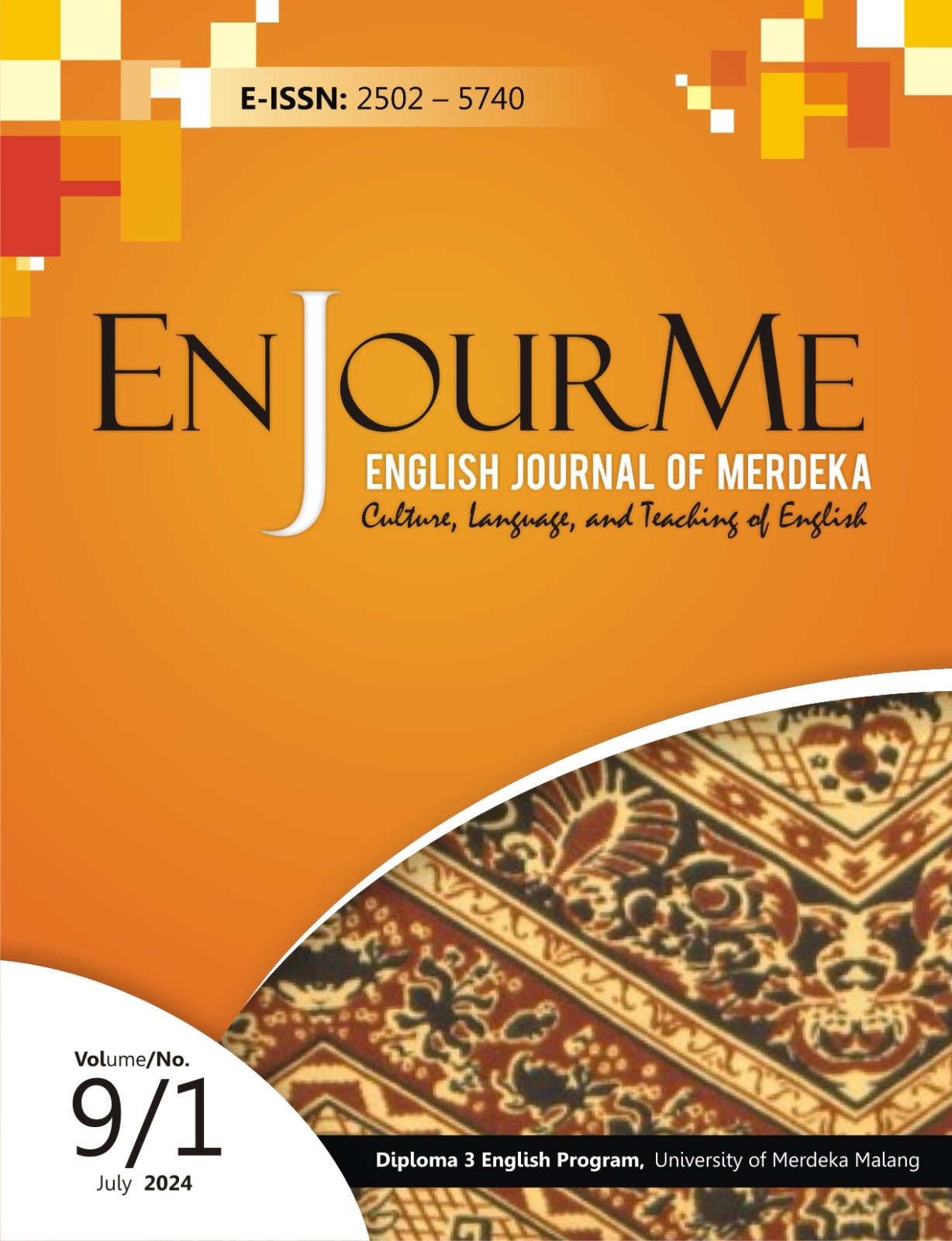T.S. Eliot and the Malaise of Modernity: An Islamic critique
DOI:
https://doi.org/10.26905/enjourme.v9i1.12936Keywords:
Islamic critique, Modern Malaise, spiritual quest, sufism, T.S. EliotAbstract
T.S. Eliot, a towering figure in the literary world, casts illuminating beams across the fragmented and spiritually barren modern landscape. This paper thoroughly examines Eliot’s oeuvre on modernity through an Islamic lens. By drawing upon Islam's philosophical and spiritual traditions, this research juxtaposes Eliot’s poetic evaluation and tapestry of Islamic perspectives as an ointment to heal the wounds of modern society. At the core of this inquiry, Islamic concepts such as the acknowledgment of the oneness of God (tawhid), mystical Islamic belief and practice (sufiism), and social solidarity (ummah) challenge Eliot’s perspective on modern sickness. This analysis also delves into Eliot’s poetic tapestry to explore how Eliot weaves a solution to the chaos of the modern era, including the fragmentation of identity, the decay of traditional values, and the existential crisis of humanity. This comparative discussion reveals how Islamic thought offers an alternative framework for comprehending the challenges of modernity. Ultimately, the research aims to contribute to a deeper understanding of Eliot’s enduring critiques and the multifaceted Islamic responses to the complexities and disorders of the modern man living under the influence of modern Western civilization.Downloads
References
Akber, A. (2022). A Desolate World of Spiritual Barrenness: A Study of TS Eliot’s Selected Poems. Journal of Dhaka International University, 12(1), 1.
Al-Badrani, F. F. A., & Al-Badarneh, A. F. (2016). Crisis of the Modern Age and the Way Out: An Examination of TS Eliot's Four Quartets. European Scientific Journal, 12(2).
Azad, J. M. (2019). T. S. Eliot’s The Waste Land: A Portrayal of Modern Predicament. European Academic Research, 7(8).
Azizmohamadi, F., & Afrougheh, S. (2011). Eliot's Rose Garden: A Sufi Interpretation. In Sarajevo: 1st International Conference on Foreign Language Teaching and Applied Linguistics.
Barzinji, M. N. H. (2013). Modernism, Modernity, and Modernisation. Research on Humanities and Social Sciences, 3(12), 43-53.
Bassou, M. (2019). The Question of Religion in T. S. Eliot’s Poetry: “Ash-Wednesday†as a Case Study. International Journal of English Language, Literature and Humanities, 7(11).
Bayumi, M. R., & Jaya, R. A. (2018). Building Integration and Interconnection in Islamic Economic System To Create Islamic Solutions in Solving Social Problems. Share: Jurnal Ekonomi Dan Keuangan Islam, 7(1), 59-80.
Bellour, L. (2016). The Religious Crisis and the Spiritual Journey in T.S. Eliot’s The Waste Land. Arab World English Journal,7 (4), 422-438. DOI:10.24093/awej/vol7no4.26
Bruno, T. (2013). Buddhist Conceptual Rhyming and T.S.Eliot's Crisis of Connection in The Waste Land and ‘Burnt Norton’. An International Journal of the Philosophical Traditions of the East, 23(4), 365-78.
Das, M. (2021). Reflections on Indian Mysticism on TS Eliot’s The Waste Land. International Journal of Multidisciplinary Studies, 6(1), 96-105.
Eliot, Thomas Stearns. TS Eliot: selected poems. Faber & Faber, 2009.
Eliot, Thomas Stearns. The Complete Poems and Plays of T. S. Eliot. Faber & Faber, 2004.
Güven, S. (2015). A Modernist Approach to TS Eliot’s The Love Song of J. Alfred Prufrock. Journal of History Culture and Art Research, 4(2), 80-87.
Hasan, M., Noori, L. S., & HamaSalih, M. S. (2015). Mysticism and Sufism in TS Eliot’s ‘The Love Song of J. Alfred Prufrock’." Research on Humanities and Social Sciences, 5(9).
Kareem, A. P. H. A. (2017). Spirituality in TS Eliot's Ash Wednesday. http://dx.doi.org/10.13140/RG.2.2.29081.31840
Kounsar, A. (2016). The Concept of Tawhid in Islam: In the Light of Perspectives of Prominent Muslim Scholars. Journal of Islamic Thought and Civilization, 6(2), 94-110.
Lewis, B. (2002). What went wrong?: Western impact and Middle Eastern response. Oxford University Press.
Mihsin, J. H. (2020) The Apocalyptic Image of the World in T. S. Eliot's "The Waste Land", International Journal of Innovation, Creativity, and Change, 14 (7).
Qarai, A. (2021). The Qur'an: With a Phrase-by-Phrase English Translation. Qarai.
Rosmizi, M., & Yucel, S. (2016). The Mujaddid of his age: Al-Ghazali and his inner spiritual journey. UMRAN-International Journal of Islamic and Civilizational Studies, 3(2), 1-12.
Rzepa, J., & Rzepa, J. (2021). A Theological History of Modernism. Modernism and Theology: Rainer Maria Rilke, TS Eliot, Czesław Miłosz, 27-88.
Sawyer, F. (2010). A reading of TS Eliot's Ash Wednesday. Koers, 75(1), 245-266.
Selamat, K., Saputra, A. R., Fadri, Z., & Hajazi, Z. (2022). The Barrenness of Modern Human Spirituality in The Seyyed Hossein Nasr's Perspective. Alfuad: Jurnal Sosial Keagamaan, 6(1), 77-85.
Senemtaşi, M (2017). The creation of hope as a spiritual solution in TS Eliot's Four Quartets (Master's thesis, Sosyal Bilimler Enstitüsü).
Sharma, L. R. (2021). Men’s Spiritual Vacuity and Inefficacy in Eliot’s Poem ‘The Hollow Men’. Shanlax International Journal of English, 10(1), 1–5.
Singh, R. (2013). A Study of Dilemma in The Hollow Men of T.S. Eliot. Galaxy International Multidisciplinary Research Journal, 2(3), 1-11.
Sufian, A. (2014). TS Eliot’s The Waste Land: Anticlimax of Modern Life in a Claustrophobic World. Galaxy: International Multidisciplinary Research Journal, 3(4).
YALÇIN, İ. (2020). The Fitrah Line in Change and Innovation. Tevilat, 1(2), 539-560.
Zhang, Q. (2023). The Modernity of T.S. Eliot's The Waste Land from the Perspective of Image. Communications in Humanities Research, 3, 794-802. DOI 10.54254/2753-7064/3/2022659
Additional Files
Published
How to Cite
Issue
Section
License
Authors who publish with this journal agree to the following terms:
(1) Copyright of the published articles will be transferred to the journal as the publisher of the manuscripts. Therefore, the author confirms that the copyright has been managed by the journal.
(2) Publisher of EnJourMe (English Journal of Merdeka) : Culture, Language, and Teaching of English is University of Merdeka Malang.
(3) The copyright follows Creative Commons Attribution–ShareAlike License (CC BY SA): This license allows to Share — copy and redistribute the material in any medium or format, Adapt — remix, transform, and build upon the material, for any purpose, even commercially.




